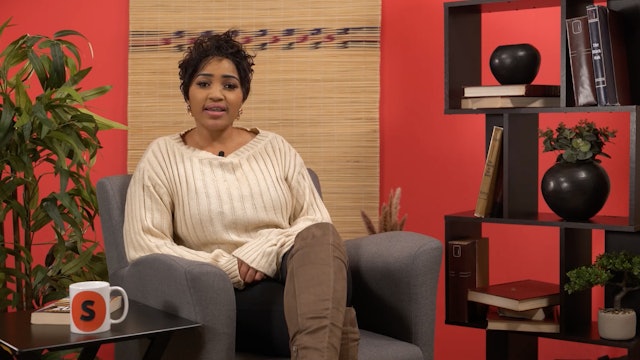Grade 8 isiZulu
4 Seasons
Learning isiZulu enhances bilingualism and intercultural communication, especially in the South African landscape as it is the most widely spoken first language in South Africa. Basic reading and writing skills are developed but listening and speaking skills are focused on intensively through the exploration of various topics and themes. The goal is to encourage meaningful communication in isiZulu.
-
Amabizomvana, Amabizoqho, Namabizomfakela / Nouns
Episode 1
By the end of this lesson you will know what nouns are and how to use nouns in a sentence?
Liyini ibizo? Ibizo lingasebenza kanjani emshweni? Liyini ibizomvama nezibonelo zawo, Liyini ibizoqho kanye nezibonelo
Amabizo mfakela. -
 17:11Episode 2
17:11Episode 2Incwadi Yakomkhulu / Formal Letter
Episode 2
There are many types of formal letters, It could be a letter asking for a job, filing a complaint, ordering, writing a newspaper.
Ziningi Izinhlobo zencwadi yomsebenzi, Kungaba incwadi ecela isikhala somsebenzi, ukwethula isikhalazo, ku-oda, ukubhalela iphephandaba.
-
 12:17Episode 3
12:17Episode 3Izihlanganiso / Conjunctions
Episode 3
A Zulu sentence is made up of a subject, a verb and when a sentence is complex or compound we use conjunctions to make those sentences into one sentence. Conjunctions make the task of combining phrases into one sentence.
Njengoba sazi ukuthi umusho wesiZulu oqondile wakhiwe yinhloko yomusho, yi...
-
 06:27Episode 4
06:27Episode 4Ukufingqa / Summary
Episode 4
After this lesson you will know what a summary is and the Instructions to follow when summarizing. An example of an episode you will summarize. Quoted and translated answers. How to make a summary.
Ngiyanamukela nonke bafundi esifundweni sethu sanamhlanje. Namhlanje sizobe sibheka ukufingqa (sum...
-
Ukubala Idayari ngesizulu / Diary Writing
Episode 5
Know the most important things to follow when making diary entries. We will also be learning about Zulu numbers.
Sobe sifunda ngokubhalwa kwedayari Uzokwazi ukuthi iyini idayari, Okubalulekile okumele ukulandele uma wenza idayari, Isibonelo sedayari yezinsuku ezinhlanu, Ngizobuye ngikwengezele n...
-
Ongumnini / possession/ forms of ownership
Episode 6
The possessive form is used with nouns referring to people, groups of people, countries, and animals. It shows a relationship of belonging between one thing and another. To form the possessive, add apostrophe + s to the noun.
asho abantu, amaqembu abantu, amazwe, nezilwane. Kubonisa ubudlelwano ...
-
07:19Episode 7
Inkulumo Mpendulwano / Dialogue
Episode 7
Know what a dialogue is, the importance of dialogue and what the reader should be aware of when writing a dialogue using an example.
Ngemuva kwalesi sifundo: Iyini Inkulumo – mpendulwano, Okubalulekile ngenkulumo mpendulwano nalokho umfundi okumele akuqaphele uma ebhala Inkulumo - mpendulwano, ...
-
Isibanjalo Nezibabazo / Pronouns and adverbs
Episode 8
Noun-adverbial pronouns, Subject pronouns, Subject-based, Conjunctions, Different types of adverbs. (interjections), using the First Paper exam from 2019 November.
Ngemuva kwalesi sifundo uzokwazi nakhu okulandelayo: Isibanjalo esisuselwa emabizweni, Esisuselwa kuzabizwana, Esisuselwa kondaweni...
-
 08:12Episode 9
08:12Episode 9Inkombandlela / Directions
Episode 9
Learn about giving direction in isiZulu and how to instruct and how to write an instruction.
Ngemuva kwalesi sifundo: Yini umyalelo? Iyini inkombandlela? Ukuze ukulayela nokulayelwa kube lula, kumele kubenjani? Isibonelo senkombandlela, Umsebenzi wabafundi wenkombandlela.
-
 15:51Episode 10
15:51Episode 10Inkondlo / A poem
Episode 10
Learn all about what a poem is, the structure of the poem, Lines of poetry, Communication, The beginning, middle and the repetition of words and repetition of meaning.
Namhlanje sizobheka nakhu okulandelayo: Yini inkondlo, Ukwakheka kwenkondlo, Imigqa yenkondlo, Izitanza zenkondlo, Ukuxhumana, ...







